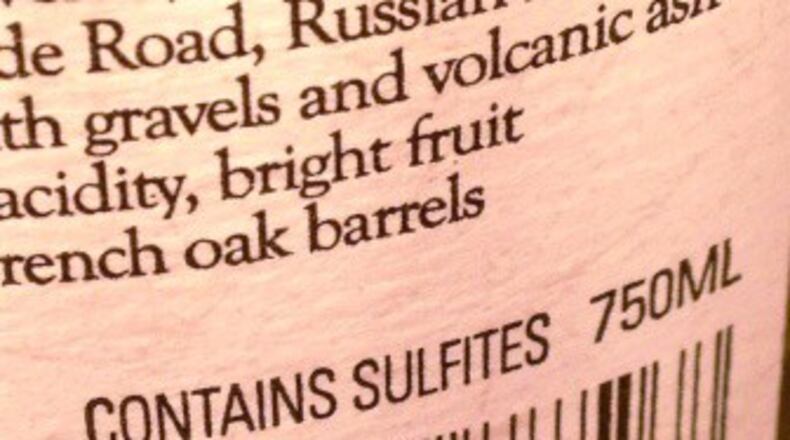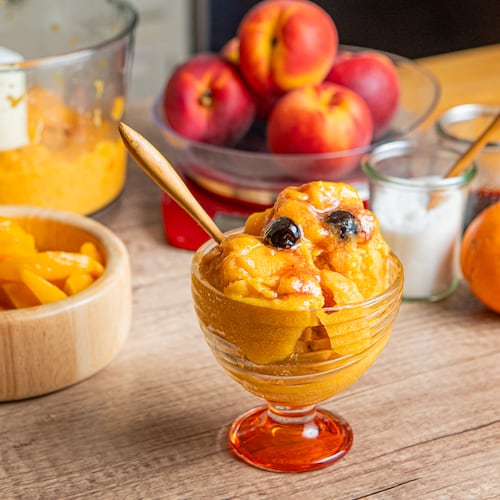Credit: Gil Kulers
Credit: Gil Kulers
Credit: Gil Kulers
Credit: Gil Kulers
There’s a burgeoning trend in winemaking in recent years often referred to as “natural winemaking.” The thrust of these throwback winemakers is that they add nothing—NOTHING—to their wines.
No pesticides or fungicides. OK, I can see that, especially if your environment allows you to grow grapes without damaging insects or fungi. No cultivated yeast strains. I’m good with that. No added tartaric acid, even if it would otherwise perk up the fruit flavor, enhance the color and make it less susceptible to certain bacteria. I could see how that would take away from the expression of what Mother Nature intended.
And, of course, no potassium metabisulfite. There’s nothing natural about chemicals, right? Well…
The natural wine movement, which not so subtly implies that modern, “un-natural” winemaking has lost touch with its roots, would have to go pretty far back to find a time when sulfur and its derivatives were not used in winemaking. Archeological evidence shows that Roman winemakers were burning sulfur candles in their amphora to ward off microbes in the first century B.C. Use of sulfur became better understood and widely accepted throughout Europe in the 19th century.
It did not take the first winemaker, who lived approximately 8,000 years ago, too long to figure out that wine spoils. And whether it is a bacterial spoilage, oxidation or unwanted fermentation, spoiled wine looks bad, smells bad and tastes bad. Since then, we’ve been trying mightily to keep wine from going south during and after fermentation. Ancient Greeks would add sea water to their wines to keep the bugs out. While I’ve not tried wines preserved with sea water, I’m guessing it’s an acquired taste.
“I’ve had natural wines and I don’t like them at all,” says Greg Morthole, winemaker for Rodney Strong Vineyards in Sonoma, Calif. “Every time I’ve had them, they’re oxidized, brown and taste like the fruit was picked really late.” Morthole, without mentioning names, recalled tasting wines from Sonoma and from Burgundy that—while touted as the true expression of their respective vineyards—were spoiled and unpleasant.
I, too, have tried my share of natural wines, which are intentionally left unarmed in the merciless game of microbial warfare. The only way I can explain them is that I appreciated them with my mind, but my tongue wanted nothing to do with them. As a sommelier, I found almost no possibilities for food pairings and they are not stable for even short-term cellaring.
[Full disclosure: After writing this column, Clarke Anderson, restaurant manager of No. 246 in Decatur and super-smart wine guy, had me sample a natural barbera wine from Piedmont, Italy. It was enjoyable and fresh while remaining quite distinct. He did not know I had written this column when he shared this wine and reports insignificant bottle variations.]
This brings us to those frightening and misleading “contains sulfites” labels found on all wines sold in the United States. Their presence has more to do with neo-prohibitionists, who petitioned the Food & Drug Administration in the 1980s for these labels, than it does with any public health threat. Soy sauce, raisins, pickles, fruit juices and other foods that contain 10 times more sulfites than any wine did not merit the attention of the temperance lobby and require no extra labeling. Many wine consumers have blindly gravitated to natural wines that eschew the use of sulfur compounds.
“We are not talking about a big, monstrous chemical,” says Morthole, who is also the former lab director at Rodney Strong and emphatically supports sustainable, organic, mostly hands-off farming and winemaking. “It is a simple, small molecule that is not mysterious. Sulfur combining with oxygen, what can be more natural than that?”
Well, Greg, what could be more natural than that? I took that question to Joel Kostka, microbiology professor at Georgia Tech. And, apparently, there are not many things (perhaps anything) more natural than that. "Sulfur is a natural part of all life," Kostka says. "Sulfur—even reduced sulfur compounds, like sulfites—are a part of us. They are inside of all our cells. It is not a compound that is unusual or synthetic."
Let me paraphrase Kostka's rather technical description of how sulfur works in winemaking: the majority of microbes and other nasties that spoil wine need oxygen to do their thing. As the Romans figured out two millennia ago, sulfur (a founding member of the periodic table) in its reduced form is highly reactive with oxygen and scavenges all the available O2 before bacteria, spoilage yeast or phenolic compounds in the wine get busy. A byproduct of additions like potassium metabisulfite to fermenting grape juice is sulfites, quite harmless to 99.5 percent of the population even at fairly high concentrations.
Sulfites are also a byproduct of the fermentation process, so there is no such thing as a sulfite-free wine. Natural winemakers can put “no added sulfites” on their label, which is not the same thing as no sulfites. Natural wines contain sulfites somewhere around 10 parts per million. Rarely will you see a wine treated with sulfur rise above 40 parts per million. Natural wine is no panacea for folks with severe sulfite allergies.
Natural winemakers are well-intended. They want to show consumers the true nature of grapes grown in a particular place and the unfiltered, raw beauty of wines made from those grapes, wines unclouded by the hand of man. That’s a great ideal to aspire to. However, these wines are incredibly sensitive to temperature, acidity levels, phenolic compounds in the wine and certainly many types of microbes that might find their way in the bottle. Not using long-established, natural sulfur compounds can mean terribly unusual flavors that vary wildly from bottle to bottle and very often (there’s no other way to put it) result in spoiled wine.
Gil Kulers is a sommelier and maitre d’ for an Atlanta country club. You can reach him at gil.kulers@winekulers.com.
About the Author
The Latest
Featured




